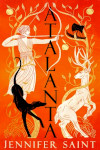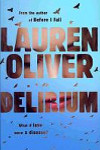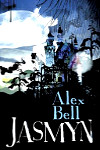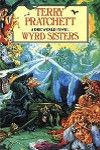Charlotte Brontë – Villette
Posted 22nd February 2011
Category: Reviews Genres: 1850s, Psychological, Social
3 Comments

Where a sound story is hindered by its length.
Publisher: (Numerous, but I’d wager Vintage would be a good one)
Pages: N/A
Type: Fiction
Age: Adult
ISBN: N/A
First Published: 1853
Date Reviewed: 18th February 2011
Rating: 3.5/5
Lucy Snowe leads a mundane life, looking after other people and staying with friends. When the chance to move to France presents itself, she takes it on impulse. An encounter with a fellow compatriot leads her to employment as an English teacher in the town of Villette. Lucy’s life at once goes back to monotony but it appears that one teacher may be interested in her, even if the interest seems negative.
On the whole, Villette isn’t a bad book. The story is good, and although not up to the standard of Jane Eyre, it is nevertheless enjoyable. The characters are interesting and there is a similar variety of genres used throughout, including a small mystery.
Apart from the obvious parallels that come from them sharing a creator, Lucy Snowe couldn’t be more different to Jane Eyre. Lucy, too, addresses the reader in that beautiful way Charlotte applies to her writing, drawing them into the fold as intimately as a friend, but she has none of the strengths of her predecessor. Lucy is always saying that her life is dull and thus it becomes very irritating when she turns down offers of, for example, a dance, which would make her more interesting – and then later reasserts her position as a person living a mundane existence. Lucy has every opportunity to improve herself but for most of the book she does not take it.
Unfortunately this means that the psychology Charlotte uses – the way she has Lucy often spending ages wondering on her life – doesn’t quite make the impact it should. To speak personally, I found myself happy that Lucy had learned something, thinking she would remember it for next time, and finding my hopes dashed again and again. Lucy is her own worse enemy and it is thanks to the goodness of other people that she develops later on. If left to her own devices entirely she surely would never have got anywhere.
Charlotte writes about her characters in a way unique to her. Maybe it’s in part because the length of her books allows for good development, but it’s more just the way she appropriates time. The best way to explain this would be to provide you with a quotation:
A constant crusade against the “amour-propre” of every human being but himself, was the crochet of this able, but fiery and grasping little man. He had a strong relish for public representation in his own person, but an extreme abhorrence of the like display in any other. He quelled, he kept down when he could; and when he could not, he fumed like a bottled storm.
The array of difference between all the characters is quite something. Lucy spends a lot of time thinking and shying away, whereas most of her acquaintances make nothing of sharing their feelings with everyone. A particularly fantastic character, for her distinct oppositeness to Lucy, is Ginevra Fanshawe, a girl at once annoying and yet so full of life that the reader cannot but love her as the antidote to a dull heroine.
There is a romantic element to the plot, for the most part subtle, one can never be sure if it will develop or not. And, as seems to be the norm with Victorian writers, there are a great many coincidences that make the story unfortunately less realistic.
Now there are three major bones of contention I must deal with. The first I will discuss briefly because otherwise I could end up talking on it at length.
Charlotte’s Protestantism. It becomes impossible to separate a personality from the book they have written when a lot of the work is clearly a lecture. Lucy is so vehemently against Catholicism that at times it makes the book impossible. Villette can come across as a sermon, and in suggesting it is a sermon I look to Charlotte’s situation as the daughter of a clergyman as my evidence – she would know well how to word her feelings. The hatred is just too much, Lucy goes on about how her “ears burned” as she was “forced” to listen to stories of the saints, and the silly thing about it is that in doing so and in going on about it frequently, Charlotte produces the opposite effect – indeed I felt sorry for those she scorned – and not only that, but she makes her Catholic characters, through their lesser strength of feeling for their opposites, or at least for the lesser amount of time afforded to them, the preferred group of people. Perhaps, then, it is in realisation of this, in realisation of the fact that Catholics could well be among the number of her readers, that makes Charlotte’s joining of the denominations later on through her characters, important.
The application of French. In my review of Jane Eyre I said that one could get by with a very basic knowledge of the French language; in Villette whole paragraphs are written in it and I presume that even an intermediate knowledge would not suffice. It’s odd really because Charlotte switches back and forth, during conversations, between English and French, where she could have just used English. Her method renders her work impossible to read in its entirely without knowledge of French, and therefore unless you possess it you will likely find yourself, as I did, skipping over large chunks of text, much of which it’s obvious is important to know for a clear understanding of the characters.
The last thing is the length of the book. The length is what makes it so dreary a read because there are chapters upon chapters of needless content, and although it effectively expresses Lucy’s mundane life, it makes a desire to read the book difficult to kindle for any long periods of time. The last third is very worthy of heralding, and the last few chapters are magnificent, the characters introduced interesting, but, because the wait for it is so long, that wait puts a damper on the novel in its entirety. It may have suited Charlotte to describe at length a profession which she had first-hand experience of, but for the monotonous routine she should have thought twice about how much she said.
I reckon that with a quick look at the back-story, one could easily skip the first half or so of the book. Villette may tie up it’s subplots well and have a brilliant cast of characters, but for the time it takes it’s not a patch on Jane Eyre.
Related Books
Julia Strachey – Cheerful Weather For The Wedding
Posted 16th February 2011
Category: Reviews Genres: 1930s, Comedy, Social
2 Comments
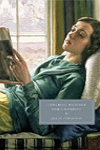
A simple story with a surprisingly poignant ending, this little book is the definition of perfection.
Publisher: Persephone Books
Pages: 115
Type: Fiction
Age: Adult
ISBN: 978-1-906462-07-9
First Published: 1932
Date Reviewed: 30th January 2011
Rating: 5/5
Dolly is getting married today and the family have arrived to be there. But Dolly’s not sure about the day’s events, and, neither it seems, is someone else.
Cheerful Weather For The Wedding was my first Persephone book, I am happy to say I picked it out myself from their fabulous little shop in London from the piles of books, not knowing what it was about but being intrigued by the title. I just knew that it was “the one”, and that I should buy it as my second choice besides The Victorian Chaise-Longue, which was the book I visited the shop for. Be sure that I will write a post on the shop itself later.
I actually started the first several pages of the book twice, once on the day I bought it, and then again on the day I devoted a couple of hours to read and finish it, because the beginning is slow. I soon found out that I had wasted time by starting it twice as after the initial introduction, Strachey quickly dives into the comedy.
“We heard about the practices of the Minoan Islanders upon reaching the age of puberty at the last one.” He started snapping up his cutlet.
“Oh really? How terribly interesting!” said Kitty.
“Yes, very. Like to hear about them?” offered Joseph.
“Kitty, dear child! Kitty! Kitty! Open the window a trifle at the top, will you! The air gets so terribly stuffy in here always!” cried out Mrs. Thatcham very loudly.
The beauty of the novella is that an author can deliver a story quickly without having to worry about detailing the characters or their backgrounds. This is exactly what Strachey does and it provides her with ample time to use in making the reader laugh. The book is hilarious. Strachey introduces us to a plethora of characters that are very individual and ridiculous whilst at the same time being realistic. To mention just a few, there is the elder brother who is obsessed about his younger brother’s sock choice (this is technically bullying but the younger child stands up for himself and it’s the “I’m-better-than-you” nature of children that makes it funny), the mother who is a little crazy and ever forgetful, and the cousin who speaks nonsense.
The company soon understood that the young man was attacked by a fit of the giggles, and all looked surprised; excepting Evelyn, to whom giggles and laughter were as water is to a fish. And so, although not understanding very exactly what was the matter, she joined in now with Joseph immediately.
What’s interesting is that there is no main character. You could say that Dolly is the main character, but it’s more a case of her being the reason – when it comes to the amount of time spent on her there is just as much as there is the group of characters downstairs. The book may (basically) be about her and the climax may be about her, but I personally found her memorable for being different, more serious than the rest.
Strachey wrote a book that takes so little time to read and yet it kept me completely enthralled and interested. It’s a wonderful thing that Persephone Books decided to publish it and easy to see why it is now one of their most-sought after novellas. I cannot recommend it enough.
Related Books
None yet
Subscribe to this site via email and you’ll receive 3 posts a week. If you use Gmail, you may find the posts are stored in your ‘social’ or ‘promotions’ tab.
Ally Condie – Matched
Posted 11th February 2011
Category: Reviews Genres: 2010s, Romance, Science Fiction
1 Comment

There’s a reason they didn’t keep this poem.
This poem tells you to fight.
Publisher: Razorbill (Penguin)
Pages: 364
Type: Fiction
Age: Young Adult
ISBN: 978-0-141-33305-2
First Published: 30th November 2010
Date Reviewed: 2nd January 2011
Rating: 5/5
It’s not every day I begin a review with a quote; in fact this is a first for me. But I can find no other way to introduce this novel.
Like all other members of her society, at 17 years of age Cassia goes to the city hall to find out who the Officials have paired her with for life. She finds herself matched to her best friend Xander and all her hopes in The Society are fulfilled, thinking those at the top really do know best. But a mistake in the information she is given about Xander leads to another person being matched to her. The Society don’t make mistakes, but is it possible they may have this time? And just how perfect is Cassia’s life, really?
Even with the summary on the back – which is nice and vague – you can’t really guess what the content will be like. What I find so brilliant about the world Condie has created is that it’s unlikely two readers will see it the same way (incidentally, as The Society like probabilities they would probably like this… and there goes another probability). In fact I’m sure I saw it as more visually stunning as Condie planned, but for me that was what worked in my head. Condie’s descriptions – as in the way she uses words – didn’t register at the time of reading but on looking back I realised just how skilled she is.
And yet there is nothing lustrous at all in the world Condie has created, if we are to speak literally. The world is the horrifying product of domination, a world in which a select group of individuals rule almost every aspect of every life – one that could possibly evolve in our own future if we aren’t careful. Condie has made technology very advanced but she hasn’t resorted to all of the usual futuristic elements – there are the odd heralds of our world today and history in the way that humans still run the show. In truth it’s partly this that makes it scary, the implementation of things we tend to agree with, such as recycling, as everything is so planned out. There are no chances, no random occurrences. To me Condie’s creation comes across much like The Sims, the game in which the player controls virtual life. The visuals in that are very cute, colourful, and represent perfection, which is what The Society of Matched are determined to exploit.
Of course with a book of this nature you cannot assume that the characters will be strong, nor can you really expect it, but Condie may surprise you here. Cassia takes a while to start realising how corrupt her world is and thus to a reader she can come across as annoying. It definitely makes you sit back and think because while you can plead her to take chances and run away, you have to remember that to her nothing is unusual. The way in which Cassia comes into her own while still believing certain things may seem difficult to understand, but it’s logical. Although Condie shows how weak The Society really is, she also shows how difficult it can be for a group of people to stand up for themselves when they know that to stay silent will result in an easy life. In this way her book is as much a commentary on our present time than a fly-on-the-wall look at a dystopian world.
I’m rather reluctant to talk about the other characters because a lot of my own enjoyment came from discovering their personalities and desires. I will simply say that both male leads are heroes and that there is little to make you prefer one to the other.
You may be wondering, as I did, how much similarity there is between Matched and the other young adult novels that have been released of late. The answer: a love triangle, and the general idea of a dystopian world. To be honest I’m not sure if I liked the fact that it is the love aspect of life is what’s focused on, I’d have preferred to have seen Cassia struggle for something a little more general, like complete freedom, but love triangles are what sells at the moment, it seems to be the key between a hit and a flop.
Towards the beginning I may have said that you don’t notice how good Condie’s descriptions of locations are while reading, but that’s not the same for the other elements of storytelling. Some lines jump from the page, such as the one I have quoted already. In that particular case it is as much the cause of the structure as the words.
Condie has exceeded my expectations. I could never have imagined such a story, such vivid description, would fill the pages.
Break the rules. Follow Cassia. Trust in Condie. Read this book.
Related Books
Alex Bell – Lex Trent Fighting With Fire
Posted 4th February 2011
Category: Reviews Genres: 2010s, Comedy, Fantasy, Western
1 Comment

Talking foxes, more fire-breathing rabbits and the anti-hero discovering a fear of octopuses. It could only be another Lex Trent book.
Publisher: Headline
Pages: 376
Type: Fiction
Age: Young Adult
ISBN: 978-0-7553-5519-8
First Published: 3rd February 2011
Date Reviewed: 30th January 2011
Rating: 4/5
The Games have been scheduled once again and, once again, Lex has been chosen. But whom will he pick as his companion this time, as he seeks a life-giving sword in the Wild West? The decision is obvious, but Lex and his companion will have to do more than simply spin a couple of pistols and walk beside the tumbleweed. One of the other players is the grandson of a person affiliated with the Trents and having been shunned, the idea of winning the three rounds becomes all the more appealing.
Lex Trent Fighting With Fire continues the same basic format as Lex Trent Versus The Gods but features a lot more events in between the rounds, providing the reader with a chance to get to know the anti-hero even better but also, this time, to see where he can be a bit nicer. That’s not to say that the character improves exactly, because he doesn’t, in fact if anything the more you learn in many respects makes your opinion of him worse, but there are some very good points to him, no matter how well he tries to conceal them, that end up surfacing during the course of the book. This allows for Lex Trent to be ever more awful without alienating the reader.
Money had made them stupid. Lex could have announced himself as Tex Lent and they still wouldn’t have put the pieces together.
Lex’s companion Jesse, is superbly stereotypical as are the other contestants, and this is one of things that makes the book fun to read. Bell exploits stereotypes almost viciously, really making the most of them, and you can’t but be amused even if sometimes in reality it wouldn’t be correct.
More so than the first book, because of the connections between the characters, the other players play a bigger role in the story, at most times being just as much important as Lex and Jesse. The game rounds are more extreme too, whereas in the first book they were very dangerous but more interesting, this time they are more nightmarish and deadly. One round, involving books, is a treat because of the very nature of readers. And Bell includes a far share of libraries.
After all, when a mysterious volcano range suddenly appears on the landscape and may erupt at any moment, what could be more natural than to build a café right there beside it?
The story is slower than Lex Trent Versus The Gods because there is more information in it. The Wild West element is a whole subplot in itself as Lex is doing more than last time; he has two games to win – again the structure and writing style aid in helping the slowness to pass.
Lex Trent Fighting With Fire continues on a theme but succeeds in taking the story further thanks to that theme. In a time when second books are generally fillers it stands out from the crowd with the golden glow of a glowing canary that’s nearing the treasure. And it fits into a sole tradition – it’s own. It is a worthy follow-up and solid piece in a series that is likely to continue.
Related Books
Alex Bell – Lex Trent Versus The Gods
Posted 27th January 2011
Category: Reviews Genres: 2010s, Comedy, Fantasy
2 Comments
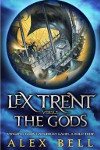
An anti-hero with a cleanliness issue plays a divinely-created game lead by a flighty Goddess in a toga.
Publisher: Headline
Pages: 344
Type: Fiction
Age: Young Adult
ISBN: 978-0-7553-5518-0
First Published: 4th February 2010
Date Reviewed: 26th January 2011
Rating: 4/5
Lex likes to make trouble and has a habit of stealing whilst supposedly studying law. Once, when he found himself on the run after an unsuccessful mission, he decided to hide in the church of Lady Luck. This lead to him being enlisted as a competitor in the games, three rounds of challenges organised by the gods. Now, unfortunately for Lex, his boss is his assistant. There’s nothing more Schmidt would like than to give the criminal the what for, but instead they will have to cooperate if they are to win against the odds.
Lex Trent Versus The Gods is an oft-hilarious novel revolving around the tasks set for Lex to complete. There is a touch of Terry Pratchett-like humour in it, especially at the beginning where you may recognise where Bell has got her inspiration from; but the similarity stops there and otherwise the book is unique.
What’s particularly interesting about the story is that the main character is an anti-hero but nevertheless a character you want to read about. Bell’s humour plays a big part in this and she extends it to the group of characters as a whole. Lex is… horrible. He’s not the most awful person by any means, enlivened somewhat by an OCD that ill-fits his “profession” and is thus very funny, but he can at times be uncomfortable to read about. His opposite exists in Schmidt, the lawyer who provides interest because of the oppositeness (and, incidentally, for his opposition) and his dialogue. Of particular note is a scene in which Lex and Schmidt attempt to walk up an ice staircase.
When you have similar themes running through a book, in this case rounds of a game, it can be easy for everything to blend together and for the reader to forget when different events occurred. This is not the case here, where Bell effectively colour codes the rounds and sets them in a variety of locations. Be sure that the game never becomes boring because of these differences and because of the strange goals set.
Generally, authors of fantasy stick with the bog-standard mythical and legendary creatures established in the genre, here and there creating new ones specifically for their own works. Bell partly continues this trend but also diverts her attention to ancient Greek mythology to add a sparkle to the first round of the game. It fits the material perfectly.
“Zoey is – as you say – a ridiculous name for a griffin. I suppose my grandfather thought it was romantic to name a huge, hulking beast after the woman he loved.”
The narrative is fast paced and easy to read. There are a few slower sections where the book can be put down for a while, but the pace means that they don’t last for long. There are also constant climaxes throughout the story owing to the games, and, something I absolutely loved because it’s the thing I don’t like about the fantasy genre – there is no long journey involved. When the scenery changes it’s only for a short while and compared to other books it’s instantaneous. It’s worth reading the book just for the mode of transport.
We always think of Gods as being in the sky. Bell turns this notion on it’s head.
The only thing I wasn’t too sure about was the element of luck, because although it’s completely rational (as Lex is supported by the Goddess of luck) it means that Lex’s tasks are comparatively easy. Not thinking realistically helps, as well as constantly reminding yourself that this is pure fantasy.
Where witches are made the prey for a king’s hunting party while simultaneously still vying for work, and teenagers are turned into fish for trying to trick magicians, you can be sure of a good story. Lex Trent Versus The Gods isn’t perfect, but it’s not far from it, and with a second book on its way I think it’s safe to say that what has been released so far bodes very well for the future.











